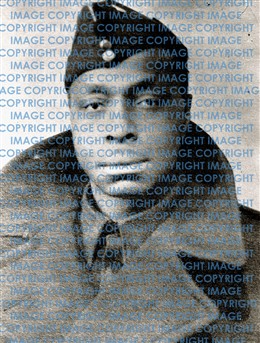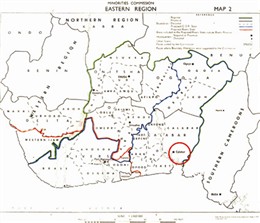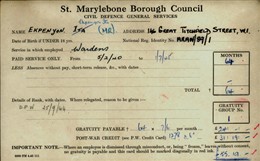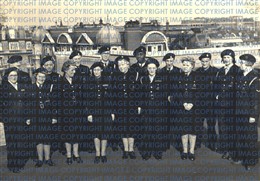A Nigerian Air-Raid Warden in St Marylebone

E.Ita Ekpenyon
Winifred Ekpenyon

1956 Map of Nigeria showing Ita Ekpenyon's birthplace, Calabar

Ita Ekpenyon service card
Copyright Westminster City Archives

E.Ita Ekpenyon with fellow St Marylebone D2 sector wardens
Winifred Ekpenyon
By Rory Lalwan
E. Ita Ekpenyon was born in Creek Town, Calabar, Nigeria in 1899. In his native country he worked as a teacher and later a headmaster. He left Nigeria to study law in London in 1928.
At the outbreak of war Ekpenyon was an early volunteer to the St Marylebone wardens' service. During the war he was to make several radio broadcasts in support of the British war effort for the Calling West Africa programme on the BBC Empire Service. One of the talks was later published as Some Experiences of An African Air-Raid Warden - in which he makes plain his wartime commitment:
"The people of the world are divided into two camps, one camp trying to enslave the world, the other camp fighting to have peace and freedom in the world"
In his account of his experiences as a warden, he vividly describes his often hazardous duties and responsibilities, conveying with immediacy the fears, camaraderie and divisions that existed in London during the Blitz.
Ekpenyon's own dedication, aptitude and popularity with those he served was recognised by his superiors and he won promotion first to Senior Warden in charge of his sector and later to Deputy Post Warden for his division.
He took part in a documentary film which recorded the commissioning of a tank funded by Nigerians as a wartime gift to Britain. He also featured as an extra in some of Paul Robeson's films and contributed to a pioneering study of his native language in The Phonetic and Tonal Structure of Efik by Ida C. Ward.
Financial hardship frustrated his ambition to pursue a legal career. Unable to find employment fitting his education and abilities, and having to support a young family, he worked in later life as a postman.